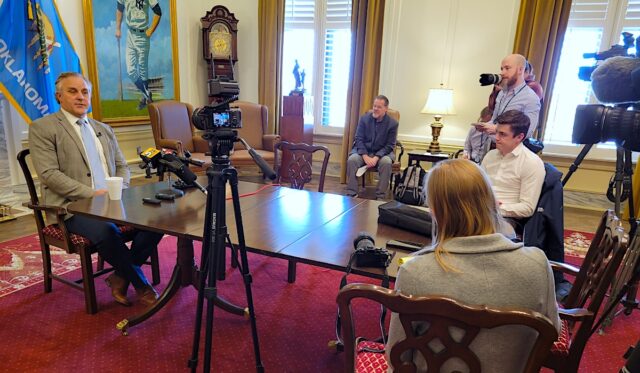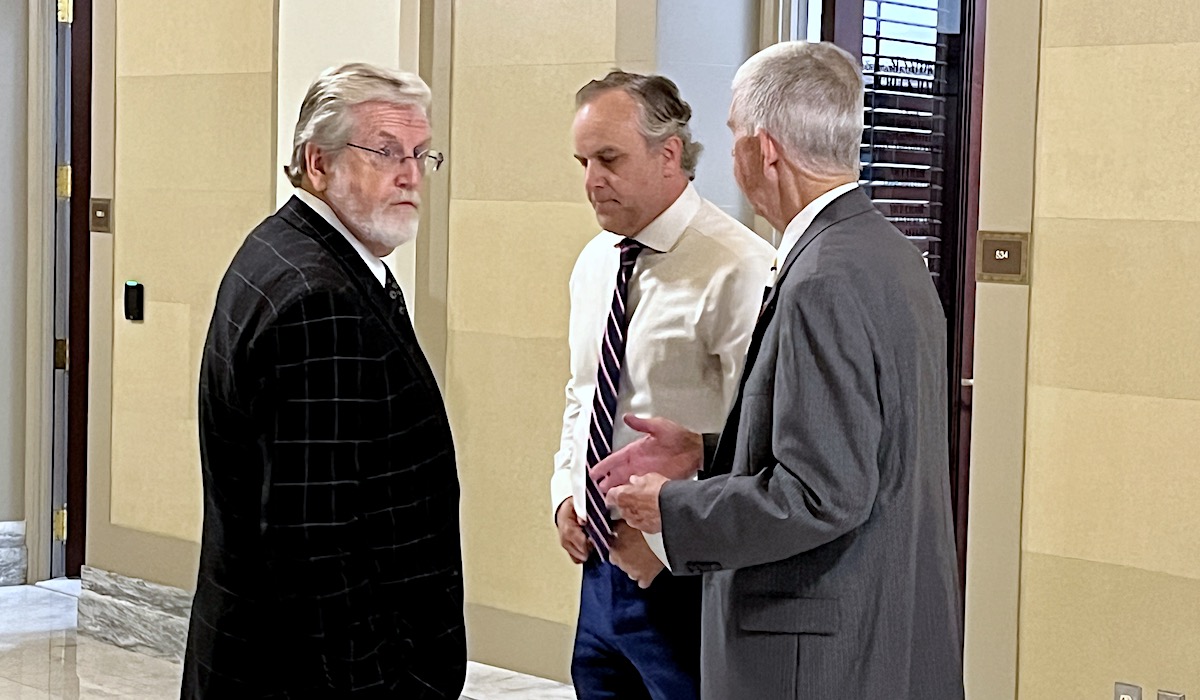
After this year’s regular session during which lawmakers and the public discovered some budget bills just hours before legislators voted on them, Senate President Pro Tempore Greg Treat announced a new budget process today that he said will “usher in a new level of transparency” for the drafting of Oklahoma’s annually appropriated state budget.
Treat (R-OKC) said he was frustrated by how delayed lawmakers were in agreeing to and announcing the Fiscal Year 2024 budget this spring. But he said work on the Senate’s new budget process plan (embedded below) actually started 18 to 24 months ago in his office and that increasing transparency has interested him since shortly after he came to the State Capitol as a freshman legislator in 2011 after a special election.
“The last session left a sour taste in a lot of members’ mouths about what happened at the very end on the budget. We were so focused on school choice and other matters that a lot of the budget stuff crept up on many members,” Treat said. “For years, I have heard criticisms from my Senate counterparts, and Oklahomans alike, about the overall budget process.”
Treat said earnest work began in May on the new budget process plan, which he said will feature weekly budget discussions held publicly on Wednesdays and a full budget proposal passed as a resolution from the Senate to the House.
“This will allow everyone to see how the budget is discussed and how it is done in the open,” Treat said. “My goal with this is to provide more transparency and more accountability for agencies who are funded through taxpayer dollars.”
The new process will start Tuesday when members of Senate appropriations subcommittees begin analyzing agency budgets and program performance measures in open meetings, said Treat, who is entering his 14th and final year as a legislator because of term limits. The appropriations subcommittee meetings are scheduled to continue through next month, with all meetings livestreamed on the Senate website.
“I am pleased that Senate leadership acknowledges the necessity of a transparent budget process,” Senate Minority Leader Kay Floyd (D-OKC) said in a statement. “Oklahomans deserve a clear explanation of where their tax dollars are going and why. This process has been out of the public eye for far too long, and I hope this new approach will enable us to craft a budget that better meets the needs of Oklahomans.”
Senate sets Dec. 15 deadline for filing bills with fiscal impacts

Later this month, the Board of Equalization will come up with a preliminary amount of state revenue for legislators to appropriate next session. The governor uses that figure to develop his proposed budget that he delivers to lawmakers during his State of the State address, which is set to kick off the 2024 legislative session Monday, Feb. 5.
Treat said Senate Appropriations and Budget Committee Chairman Roger Thompson (R-Okemah) will use the BOE’s December estimate to delegate each subcommittee an amount of money they will have to appropriate next session. Then, subcommittee chairpersons will appear before the Senate Appropriations and Budget Committee in “an open meeting, not in a closed-door meeting” and advocate funding for their agencies.
Thompson said another part of the Senate’s 2024 budget process plan is requiring senators to file bills that have a fiscal impact by the middle of this month “so that we can get a full fiscal (analysis).”
“For the staff to be able to work on the fiscal analysis and get everything ready for session, that deadline is Dec. 15,” Thompson said.
Treat said once the Senate Appropriations and Budget Committee approves a budget, a Senate resolution incorporating the approved Senate proposal will be drafted, voted on and sent to the House. His goal is to have senators vote on the resolution during the seventh week of session, or about the time of spring break in March.
“That will be the starting point of negotiations with our counterparts,” he said. “We will not be having negotiations prior to that with the House or the governor.”
Treat’s budget process comes two months after Gov. Kevin Stitt called a special session with adding transparency requirements to the state budget process listed in his priorities.
Functionally, that special session ended up lasting about five hours. Without offering details related to fiscal impact, Stitt also sought a state income tax reduction as well as creation of a “trigger” that would move the state toward eliminating the individual income tax entirely if a court finds that tax “inapplicable to any individual by virtue of their race, heritage, or political classification.”
Treat called on the governor to appear Oct. 3, the first day of the special session, before the Senate Appropriations and Budget Committee to answer questions on revenue that would be lost by eliminating or reducing the individual income tax. Stitt declined to testify before senators, instead appearing at a press conference to say the state is collecting too much money and citizens should keep more of it.
Treat was miffed at the time.
“We wanted to give the governor the benefit of the doubt that he would actually show up and defend his plan,” Treat said in October. “I’m very disappointed that he chose not to. It’s not like he was out of the country, it’s not like he was out of state, he was downstairs. He was three floors down holding a press conference called obviously after we had invited him to the 10 a.m. (committee meeting).”
Asked his thoughts about Stitt’s proposal to require the Legislature to give the public more time to read budget bills before they are considered for votes, Treat said that “transparency in and of itself has value.”
“I did not like the way the budget went down this past session,” Treat said in October. “I was quite agitated, and so I have been — along with my appropriations chair and vice chair and staff — have been working on budget transparency that is going to blow his proposal out of the water.”
But Treat’s budget plan timeline released Monday did not mention the Joint Appropriations and Budget Committee (or JCAB) process in which House and Senate members take up budget-related bills negotiated at the end of session, often with little time for the public to review. This May, for instance, leaders of the Oklahoma Legislature revealed budget bills in the 11 p.m. hour on a Sunday, with Joint Appropriations and Budget Committee meetings scheduled to consider the bills the next morning.
“JCAB will still happen,” Treat said Monday. “JCAB bills have part of the budget, but they also have bills that come through that cost money. We will be allocating around 75 to 80 percent of the monies that are in that Board of Equalization meeting to the subcommittees to disburse, and we’ll be holding some back for bills that cost money or any tax policies that we may have.”
Treat said that some of the details about the Senate’s new budget process “will take care of themselves.”
“We will have to have had a discussion on it prior to that JCAB discussion for us to be able to actually advance it,” Treat said. “It’s not going to be perfect. Our desire is that we don’t have those last-minute items pop up, and we hope that this minimizes if not outright eliminates that.”
Thompson called the budget plan “a great move” and would like to see its approach to openness apply to JCAB measures as well. He stopped short of making a pledge that JCAB bills would be filed with enough time to give the public at least 24 hours to review.
“I want more transparency,” he said. “I wasn’t happy last year either with a lot of the way that all happened toward the end. We’ve got to do a better job. (…) There are things outside of our control, so I can’t make any guarantees, but I want our members watching those bills, and I’d like to take the JCAB through the same process.”
In October, House Speaker Charles McCall (R-Atoka) said he would pledge to put at least 24 hours between JCAB bills being revealed and being voted on to allow public review.
“Yes, I can make that pledge,” McCall said.
Stitt released a statement praising the Senate’s new budget process.
“I’m glad Senator Treat is taking action on budget transparency,” Stitt said. “We have to slow the growth of government and Oklahomans deserve to know how their money is being spent. Legislators need time to review the budget before they vote on it instead of getting it at the 11th hour. I hope we can accomplish that this session.”
Review the Senate budget plan timeline
